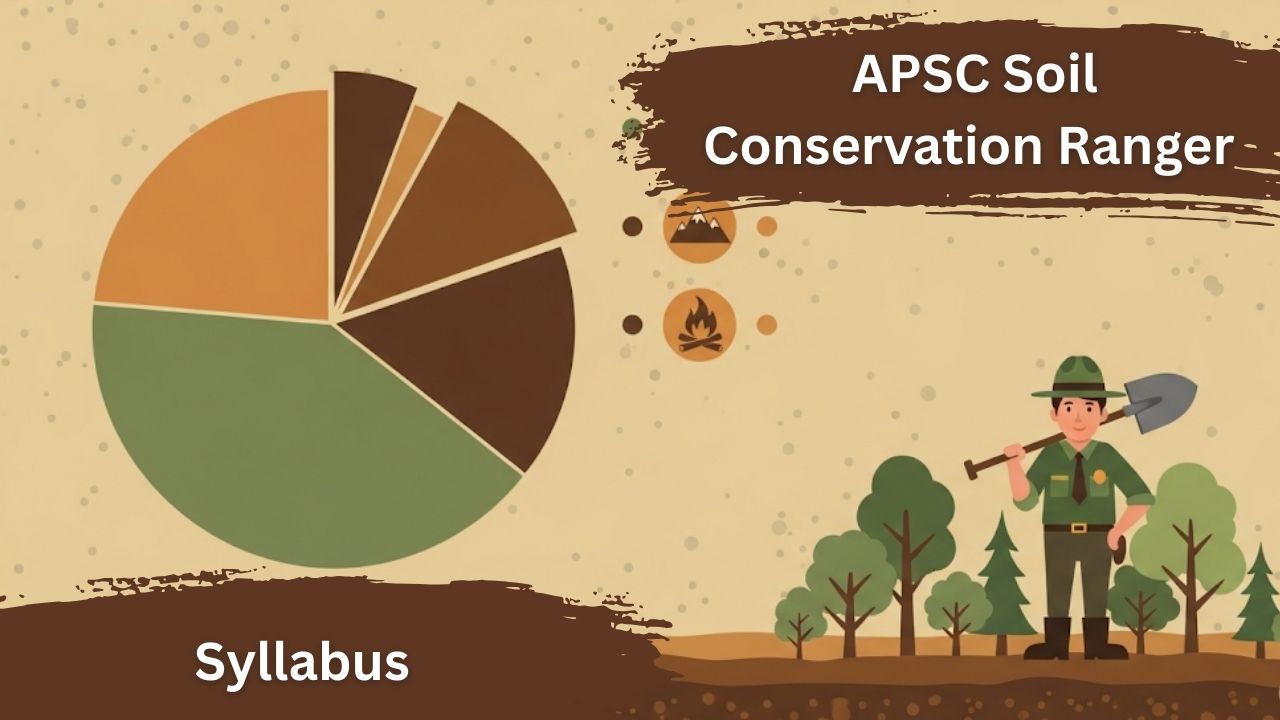Are you aspiring to become a Soil Conservation Ranger in Assam? The Assam Public Service Commission (APSC) has released the syllabus for the Screening Test/Written Test under Advertisement No. 25/2025. This comprehensive guide covers the Soil Conservation Ranger Syllabus 2025, exam pattern, and detailed topics for all papers. Whether you’re searching for “APSC Soil Conservation Ranger Exam Syllabus” or “Assam Soil Conservation Department Recruitment 2025”, you’ve landed on the right page. Read on to boost your preparation and ace the exam!
Exam Overview: Soil Conservation Ranger Recruitment 2025
The recruitment process includes a Screening Test/Written Test for the post of Soil Conservation Ranger in the Soil Conservation Department, Assam. The exam consists of four papers:
- Paper-I: General Knowledge (100 Marks, 2 Hours, Multiple Choice Questions)
- Paper-II: General English (100 Marks, 3 Hours, Conventional Type)
- Paper-III/IV: Optional Subject (200 Marks, 2 Hours, Multiple Choice Questions)
Candidates must choose one optional subject from the list provided. The syllabus is designed to test your knowledge in general awareness, language skills, and specialized fields relevant to soil conservation.
Key Details:
- Advertisement No.: 25/2025 (Dated: 4th July 2025)
- Conducting Body: Assam Public Service Commission (APSC)
- Location: Jawaharnagar, Khanapara, Guwahati-22
Prepare strategically by focusing on current events, Assam-specific topics, and your chosen optional subject. Now, let’s dive into the detailed syllabus.
Paper-I: General Knowledge Syllabus
This paper assesses your awareness of current affairs, geography, history, and science. It’s MCQ-based, so practice with quizzes for better results.
| Topic | Key Sub-Topics |
|---|---|
| Current Events | National, international, and state-level developments; Government schemes; Latest events from newspapers; International relations; Socio-economic issues |
| World Geography | India & Assam resources; Environmental changes; Landforms; Physical and political geography; Climate; Assam’s rivers, forests, and biodiversity |
| Constitution of India | Fundamental rights and duties; Emergency provisions; Roles of government branches; Constitutional amendments; Governance structure; Legal provisions |
| History | World, India, and Assam major events; Independence movements; Regional developments; Medieval kingdoms; Ancient civilizations; Freedom struggles; Assam’s cultural heritage |
| Science & Technology | Agricultural innovations; Technology in daily life; National progress; Space missions; Government research programs |
Paper-II: General English Syllabus
This conventional-type paper tests your language proficiency. Expect essay writing, comprehension, and grammar exercises. Time management is key with the 3-hour duration.
| Topic | Description |
|---|---|
| Grammar | Understanding and applying rules; Sentence construction; Parts of speech; Verb tenses |
| Vocabulary | Wide range of words and meanings |
| Synonyms/Antonyms | Identifying similar and opposite meanings |
| Cloze Test | Filling missing words in passages for vocabulary and comprehension |
| Idioms and Phrases | Understanding and using common expressions |
| Fill in the Blanks | Testing vocabulary and grammar via sentence completion |
| Error Spotting | Identifying grammatical or usage errors |
| Comprehension Passages | Reading unseen passages and answering questions |
| One-Word Substitution | Replacing phrases with single words |
| Essay Writing | Structured and coherent essays on given topics |
| Précis Writing | Summarizing passages concisely |
| Comprehension and Expression | Clear understanding and expression of ideas |
| Correction of Common Errors | Identifying and correcting writing errors |
Tip: If you’re looking for “General English Syllabus for APSC Exams”, practice with previous year papers to improve your score.
Paper-III/IV: Optional Subjects Syllabus
Choose one optional subject based on your background (Bachelor’s Degree Standard). Each is MCQ-based and carries 200 marks. Below is a breakdown for each option.
1. Agriculture
Based on B.Sc. Agriculture standard.
| Topic | Key Sub-Topics |
|---|---|
| Agronomy and Horticulture | Crop rotation; Pest control; Organic farming |
| Agricultural Economics and Extension Education | Market structures; Pricing policies; Rural development programs |
| Plant Pathology and Entomology | Plant diseases; Pest management; Biological control; Disease symptoms |
| Animal Husbandry and Dairy Science | Livestock management; Poultry farming; Breeding techniques; Dairy production |
| Soil and Water Conservation Engineering | Water resource management; Irrigation; Erosion control |
2. Agriculture Engineering
Focuses on engineering applications in agriculture.
| Topic | Key Sub-Topics |
|---|---|
| Soil and Water Conservation Engineering | Soil properties; Erosion control; Water management; Irrigation; Drainage; Watershed management |
| Farm Machinery | Design, operation, and maintenance of tractors, harvesters, etc. |
| Agricultural Structures | Design and construction of farm buildings and storage |
| Irrigation Engineering | Design of canals, dams, and water networks |
| Engineering Mathematics | Calculus; Differential equations; Linear algebra |
| Surveying | Techniques for positioning points on Earth’s surface |
| Soil Mechanics | Properties and behavior of soils for foundation design |
| Hydraulics | Fluid mechanics, especially water for irrigation |
3. Horticulture
Emphasizes cultivation and management of plants.
| Topic | Key Sub-Topics |
|---|---|
| Fruits and Vegetables | Cultivation practices; Climatic requirements; Planting systems; Nutrient/water management; Post-harvest handling |
| Plant Protection | Diseases and pests; Causes; Classification; Control measures |
| Soil Science | Soil health; Fertility; Management for crop production |
| Agricultural Economics and Extension | Rural development; Farm management; Extension roles |
| Horticultural Products | Processing; Packaging; Marketing |
| Modern Concepts | Plant regulators; Enzymes; Photosynthesis |
| Landscaping and Floriculture | Landscape design; Ornamental plants; Lawns and gardens |
| Specific Crops | Major fruits/vegetables in India/Assam |
| Pest and Disease Management | Integrated pest management; Biological control |
| Additional Areas | Ornamental Horticulture; Biotechnology; Medicinal crops; Microbiology; Pomology; Fundamentals of Horticulture; Mycology; Post-harvest technology |
4. Botany
Covers plant biology and related fields.
| Topic | Key Sub-Topics |
|---|---|
| Cell Biology | Cell structure/function; Organelles; Cytoskeleton; Cell signaling; Mitosis/meiosis |
| Genetics | Mendelian genetics; Linkage; Molecular genetics; Mutations; Quantitative genetics |
| Plant Physiology | Photosynthesis; Respiration; Growth; Hormones; Environmental responses |
| Ecology | Ecosystems; Factors; Plant communities; Succession; Phytogeography (India/Assam) |
| Plant Breeding | Principles; Polyploidy; Mutation breeding |
| Evolution | Theories and evidence |
| Economic Botany | Cultivation/uses of cereals, legumes, oilseeds, fibers, beverages, medicinal plants |
5. Chemistry
Advanced concepts in various branches.
| Topic | Key Sub-Topics |
|---|---|
| Inorganic Chemistry | Structure; Bonding; Coordination; Organometallic; Solid-state; Bioinorganic |
| Organic Chemistry | Reaction mechanisms; Stereochemistry; Synthesis; Spectroscopic analysis |
| Physical Chemistry | Thermodynamics; Kinetics; Quantum mechanics; Spectroscopy; Statistical mechanics; Surface chemistry |
| Analytical Chemistry | Chromatography; Spectroscopy; Electrochemistry; Mass spectrometry |
| Specializations | Materials Chemistry; Biochemistry; Computational Chemistry |
6. Physics
In-depth physics topics.
| Topic | Key Sub-Topics |
|---|---|
| Quantum Mechanics | Perturbation theory; Scattering; Quantum field theory |
| Classical Mechanics | Lagrangian/Hamiltonian; Rigid body dynamics; Continuum mechanics |
| Electromagnetism | Fields and waves; Relativistic formulations |
| Statistical Mechanics | Ensembles; Phase transitions |
| Mathematical Physics | Complex analysis; Linear algebra; Group theory; Differential equations |
| Specializations/Electives | Condensed Matter; Particle Physics; Astrophysics; Nuclear Physics; Atomic/Molecular/Optical Physics |
7. Geology
Earth sciences focus.
| Topic | Key Sub-Topics |
|---|---|
| Physical Geology | Earth’s structure; Plate tectonics; Processes (volcanism, earthquakes, weathering); Landforms |
| Mineralogy | Composition; Properties; Identification of minerals |
| Petrology | Rocks (igneous, sedimentary, metamorphic); Formation; Classification |
| Structural Geology | Deformation; Folds; Faults; Tectonic forces |
| Stratigraphy | Rock layering; Geological timescale |
| Paleontology | Fossils; History of life; Past environments |
| Additional Areas | Geochemistry; Geophysics; Economic Geology; Hydrogeology; Environmental Geology |
8. Forestry
Forest management and ecology.
| Topic | Key Sub-Topics |
|---|---|
| Forest Management | Mensuration; Inventory; Valuation; Principles |
| Silviculture | Establishment; Composition; Growth; Quality control |
| Forest Ecology | Ecosystems; Biodiversity; Interactions |
| Forest Biology and Tree Improvement | Genetics; Breeding; Seed technology |
| Forest Products and Utilization | Wood anatomy; Products; Non-timber products; Marketing |
| Wildlife Management | Populations; Habitats; Resource management |
| Specific Topics | Dendrology; Genetics/Biotech; Ecology/Conservation; Wood Anatomy; Ethnobotany; Logging; Non-Timber Products; Biotechnology |
9. Environmental Science
Focus on ecology and sustainability.
| Topic | Key Sub-Topics |
|---|---|
| Ecology and Ecosystems | Principles; Energy flow; Types (terrestrial/aquatic); Cycles; Stability; Population ecology |
| Environmental Pollution | Types (air, water, soil, etc.); Sources/Impacts; Waste management; Control; E-waste/Plastics |
| Biodiversity | Levels; Measurement; India/Assam flora/fauna; Threatened species; Protected areas |
| Environmental Impact Assessment (EIA) | Importance; Process; Components; Drawbacks |
| Climate Change | Greenhouse gases; Global warming; Ozone depletion; Acid rain; Sustainable development |
| Environmental Ethics and Social Issues | Unsustainable practices; Water conservation; Resettlement; Legislation |
| Government Initiatives | National/International policies; Conservation projects |
10. Civil Engineering
Engineering principles for infrastructure.
| Topic | Key Sub-Topics |
|---|---|
| Construction Materials | Properties and uses |
| Transportation Engineering | Road construction |
| Surveying | Principles and techniques |
| Geotechnical Engineering | Soil mechanics; Foundation engineering |
| Environmental Engineering | Water supply; Wastewater; Air pollution |
| Estimation and Valuation | Cost estimation; Property valuation |
| Construction Management | Planning; Scheduling; Execution |
| Water Resource Engineering | Hydrology; Irrigation; Dams; Open channel flow |
| Sanitary Engineering | Waste management; Sanitation systems |
| Design of RCC Structures | Reinforced concrete design |
Preparation Tips for Soil Conservation Ranger Exam 2025
- Study Plan: Allocate time for GK (daily current affairs), English (practice writing), and your optional (focus on core topics).
- Resources: Refer to NCERT books for basics, standard textbooks for optionals, and APSC previous papers.
- Mock Tests: Take timed MCQs to simulate exam conditions.
- Assam Focus: Emphasize state-specific geography, history, and biodiversity.
Official Syllabus: Download PDF
This APSC Soil Conservation Ranger Syllabus 2025 guide is your one-stop resource for success. Share this post if it helped, and stay tuned for updates on admit cards and results. For more on “Assam Government Jobs 2025”, bookmark our site!
Also See: APSC PHED JE Recruitment for 187 posts
Also See: Bhaona of Assam: A Vibrant Cultural and Spiritual Tradition





